Best Crypto Exchanges and Apps in March 2024

If you’re thinking about buying or trading cryptocurrencies, it’s important to use the best crypto exchange. The exchange you use will determine what crypto coins you can buy and sell, how much you’ll pay to trade cryptocurrency, and what analysis tools you’ll have to help you make decisions.
There are hundreds of crypto exchanges available today, but they vary widely in terms of features, pricing, and trustworthiness. We’ve done the hard work of evaluating dozens of top exchanges to find the best ones so you don’t have to.
In this guide, we’ll present the 10 best crypto exchanges and apps for 2024 and explain everything you need to know about how to choose a crypto exchange.
The overall best crypto exchanges and apps for 2024 can be found in the list below:
- eToro – Overall best crypto exchange with innovative copy trading tools.
- MEXC – Best for 0% spot trading fees.
- OKX – Comprehensive platform that works well with bots.
- Kucoin – Top altcoin exchange with more than 700 supported coins.
- Binance – The world’s biggest crypto exchange.
- Coinbase – Popular crypto exchange for the UK and worldwide beginners.
- Kraken – Gain exposure to 185+ crypto markets, UK accepted.
- Prime – Upto 100x leverage available on Bitcoin trades.
- ByBiT – 1000+ coins available for spot trading.
- MargeX – Highly liquid platform offering 100x leverage.
- Gemini – Solid crypto exchange for serious traders.
The Top Crypto Exchanges of 2024
Let’s dive straight into our list of the best crypto exchanges for 2024. We’ll cover the key things you need to know about what makes each exchange stand out for different types of crypto trading and investing.
1. eToro – Overall Best Crypto Exchange
Key Takeaways:
- 70+ of the most popular crypto available
- Handy copy trading feature for beginners
- Proprietary wallet included
- Extremely large (30m+) customer base
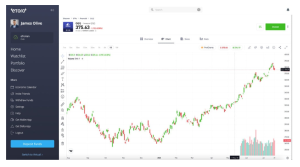
eToro is one of the biggest names in the industry and currently has an impressive 30 million plus clients worldwide. Founded in 2007, eToro provides access to over 70 crypto trades and a variety of stocks and ETFs.
Why We Chose eToro: eToro has a well-designed and easy to use lay out which makes it ideal for beginners. eToro also offers all the top cryptocurrencies alongside a wide variety of handy features and tool, such as its famous CopyTrading tool.
In total, eToro customers have direct access to over 5000 financial products. Popular features include a handy Copy Trading tool, which allows you to copy the portfolio of successful crypto traders, as well as a $100,000 demo trading account to sharpen skills.
With fees kept at just 1%, eToro is one of the best online trading platforms available today. eToro is available on both desktop and mobile app.
The platform is well designed and easy to learn and with a minimum deposit of just $10, new users can start trading straight away. eToro’s user friendly interface means that the platform appeals to both beginners and experienced traders alike.
Pros
- 70+ tokens available
- 27 million clients
- Copy successful traders
- Competitive 1% trading fee
- Highly intuitive mobile app
Cons
- Suited to traders seeking custodial storage
- $5 withdrawal fee
2. MEXC – Best Crypto Exchange for Futures Trading
Key Takeaways:
- Offers 1,800+ spot trading pairs and hundreds of futures trading pairs
- Trading fees from 0.1% for spot trades and 0.01% for futures trades
- Buy crypto with a credit/debit card, P2P, or spot trading
- Offers welcome bonuses, challenges, and competitions
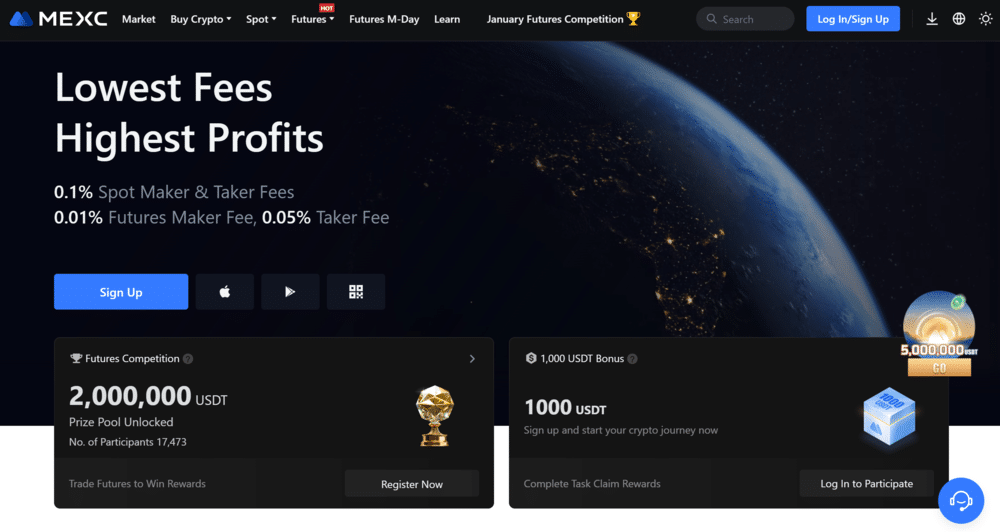 MEXC is a global crypto exchange established in 2018 and registered in Seychelles. It has more than 10 million users in 170+ countries and offers more than 1,800 spot trading pairs.
MEXC is a global crypto exchange established in 2018 and registered in Seychelles. It has more than 10 million users in 170+ countries and offers more than 1,800 spot trading pairs.
Why We Chose MEXC: MEXC stands out as one of the overall top crypto exchanges for all crypto users. It offers industry-leading trading fees, a huge selection of coins to trade, and an outstanding user experience.
Our favorite thing about MEXC is that it’s created a hub for low-cost crypto futures trading. Users can trade futures contracts for hundreds of popular cryptocurrencies, including top altcoins like $MANA, $APE, $SOL, and more. MEXC offers up to 200x leverage for futures trading and contracts can be settled in USDT or the underlying token.
Pros
- Trade 1,800+ cryptocurrency pairs
- Futures trading for hundreds of altcoins with 200x leverage
- Spot trading fee from 0.1%
- Offers $1,000 USDT welcome bonus
Cons
- High withdrawal fees
- Only supports USD, EUR, and GBP for fiat deposits
3. OKX – Best Mobile Exchange App
Key Takeaways:
- Tier-1 crypto exchange with 300+ cryptocurrencies to trade
- Offers a wide range of services including spot, futures, options, and margin trading
- Caters to traders with trading bots, copy trading, technical charts, and market analysis
- Mobile app (iOS and Android) offers access to all OKX features on the go
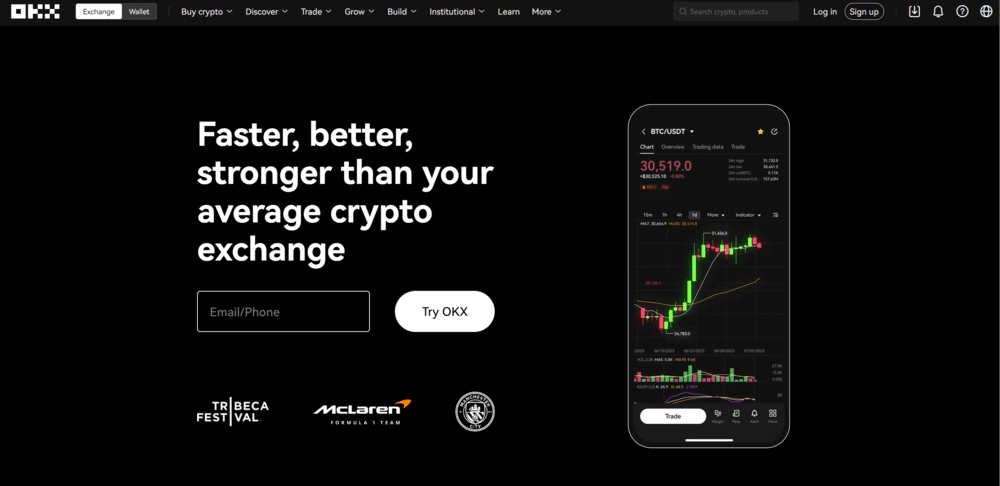 OKX is the 6th-largest crypto exchange in the world by volume, according to CoinMarketCap. The exchange, founded in 2017, has more than 20 million users and offers more than 300 cryptocurrencies for trading. OKX offers a wide range of services including spot, futures, and option trading, margin and crypto loans, and staking.
OKX is the 6th-largest crypto exchange in the world by volume, according to CoinMarketCap. The exchange, founded in 2017, has more than 20 million users and offers more than 300 cryptocurrencies for trading. OKX offers a wide range of services including spot, futures, and option trading, margin and crypto loans, and staking.
Why We Chose OKX: OKX is a major crypto exchange that any trader should consider using. It offers extremely low trading fees starting from only 0.1% for spot trading and 0.05% for futures trading. While OKX has fewer altcoins than other exchanges, the availability of margin and crypto options make this platform a great choice for traders.
OKX especially stands out for its mobile app, which is one of the most user-friendly exchange apps we’ve tested. The app lets users buy and sell crypto instantly with fiat, plus offers access to advanced technical charts for spot trading. You can also find an NFT marketplace on the app and stake tokens to earn interest.
Pros
- Offers spot, futures, options, and margin trading
- Trustworthy exchange registered in Seychelles
- Mobile app offers instant buy and spot trading
- Supports trading bots and copy trading
Cons
- Not available in the US
- Relatively limited selection of altcoins
4. Kucoin – Best Exchange for Staking and Earning
Key Takeaways:
- 4th-largest exchange in the world with 30+ million users
- Offers spot trading on 700+ cryptos along with futures trading
- Comprehensive staking program supports nearly 50 popular tokens
- Earn APY without staking through a unique crypto savings program
 KuCoin is the 4th-largest crypto exchange by trading volume and boasts more than 30 million users around the world. The exchange was founded in 2017 and is registered in Seychelles, with offices in Hong Kong and Singapore. KuCoin offers trading on more than 700 cryptocurrencies.
KuCoin is the 4th-largest crypto exchange by trading volume and boasts more than 30 million users around the world. The exchange was founded in 2017 and is registered in Seychelles, with offices in Hong Kong and Singapore. KuCoin offers trading on more than 700 cryptocurrencies.
Why We Chose KuCoin: KuCoin has a wide range of services to cater to every type of crypto trader and investor. The platform supports spot trading on more than 700 cryptocurrencies, plus offers trading bots and margin trading. Derivatives traders can find crypto futures and inverse coin-margined contracts.
KuCoin also has one of the best staking and earning programs available from any major exchange. Users can stake nearly 50 tokens with flexible staking terms and earn up to 16% APY. KuCoin also has a savings program that enables users to earn APY on their holdings without staking. Users can earn even more by holding KuCoin’s native $KCS token.
Pros
- Trustworthy exchange with huge global user base
- Supports fiat deposits in 48 currencies
- Excellent user interface and mobile app
- Easy to start earning APY through staking and earning
Cons
- Doesn’t offer crypto options trading
- Customer service is mediocre
5. Binance – Best Exchange for Low Trading Fees
Key Takeaways:
- World’s largest crypto exchange with $13 trillion in daily trading volume
- Massive range of crypto services including spot, futures, margin, and P2P trading
- No fees for any BTC trading pairs
- Users get 25% off spot trading fees when holding $BNB
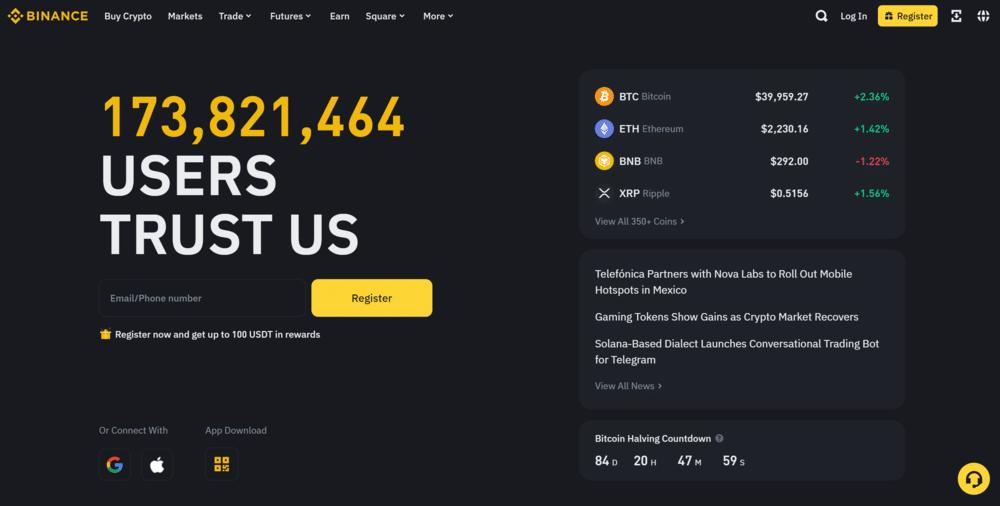 Binance is the world’s largest crypto exchange by a wide margin. The platform has more than 173 million users in almost every country, including the US. The company faced a $4.3 settlement in 2023 as part of a US criminal case because it failed to abide by US sanctions. However, the investigation was positive for Binance in that it found no cases of customer fraud by the company.
Binance is the world’s largest crypto exchange by a wide margin. The platform has more than 173 million users in almost every country, including the US. The company faced a $4.3 settlement in 2023 as part of a US criminal case because it failed to abide by US sanctions. However, the investigation was positive for Binance in that it found no cases of customer fraud by the company.
Why We Chose Binance: Binance is the world’s most popular crypto exchange for a reason. It has an absolutely enormous selection of services for crypto users, including instant buy/sell, spot trading, derivatives trading, an NFT marketplace, and more. Binance also has its own launchpad for new cryptocurrencies, an earn program for staking rewards, and a P2P marketplace.
The biggest draw to Binance, though, is its trading fees. Spot trading fees at Binance start at 0.1%, which is in line with other major exchanges. But users get a 25% discount for holding Binance’s $BNB token and can drop their fees as low as 0.012% with volume discounts. Even better, all Bitcoin trading pairs at Binance are fee-free.
Pros
- 360+ cryptocurrencies and 1,100+ trading pairs
- Welcome bonus worth up to $100 USDT
- Available in most countries including US
- No fees for Bitcoin trading pairs
Cons
- Lowest fees require holding $BNB
- Exchange has faced regulatory issues in multiple countries
6. Coinbase – Most Trustworthy Crypto Exchange
Key Takeaways:
- US-based crypto exchange partnered with numerous traditional financial institutions
- Conducts due diligence on listed tokens and doesn’t offer derivatives
- Offers a crypto wallet, staking program, and advanced trading tools
- Earn up to $400 in crypto by taking educational courses
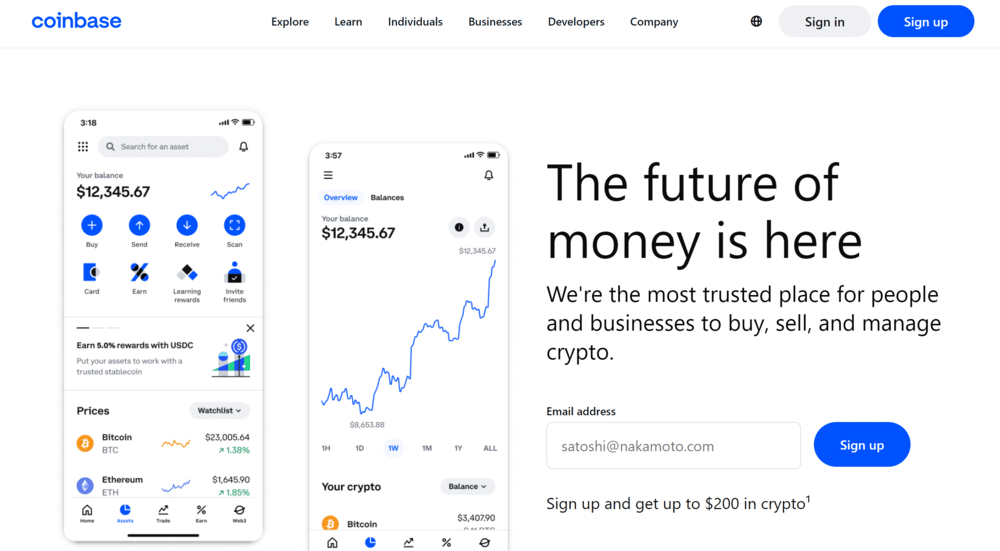 Coinbase is the largest US crypto exchange and a partner for many traditional financial institutions in the US. Most recently, Coinbase became the custodian for Bitcoin ETFs from Blackrock, Invesco, Greyscale, and others. Coinbase is one of the largest crypto exchanges in the world, second only to Binance, with more than $2 trillion in daily trading volume.
Coinbase is the largest US crypto exchange and a partner for many traditional financial institutions in the US. Most recently, Coinbase became the custodian for Bitcoin ETFs from Blackrock, Invesco, Greyscale, and others. Coinbase is one of the largest crypto exchanges in the world, second only to Binance, with more than $2 trillion in daily trading volume.
Why We Chose Coinbase: Coinbase is one of the most trustworthy crypto exchanges in the world. It’s US-based and publicly traded on the NASDAQ stock exchange, making it one of the only crypto exchanges that reports financial data quarterly. Coinbase keeps more than 90% of customer funds in cold storage wallets.
Coinbase is somewhat more limited than other exchanges in terms of coin selection and trading instruments, which is partly due to US regulations. There are no crypto derivatives and the exchange has only around 250 coins. However, Coinbase performs thorough due diligence on the tokens it lists, meaning users can feel more comfortable buying these cryptocurrencies.
Pros
- Offers up to $100 welcome bonus for new users
- Publicly traded company with quarterly financial reporting
- 90% of customer funds are in cold storage wallets
- Beginner-friendly interface for buying crypto with fiat
Cons
- No crypto derivatives trading
- Only offers trading on around 250 cryptocurrencies
7. Kraken – Best Exchange to Buy Crypto with Fiat
Key Takeaways:
- Buy 200+ cryptos instantly with 9 fiat currencies
- Lower instant buy fees than other exchanges, but higher spot trading fees
- Offers margin trading up to 5x and futures trading on 95 cryptos
- 24/7 live chat customer support available
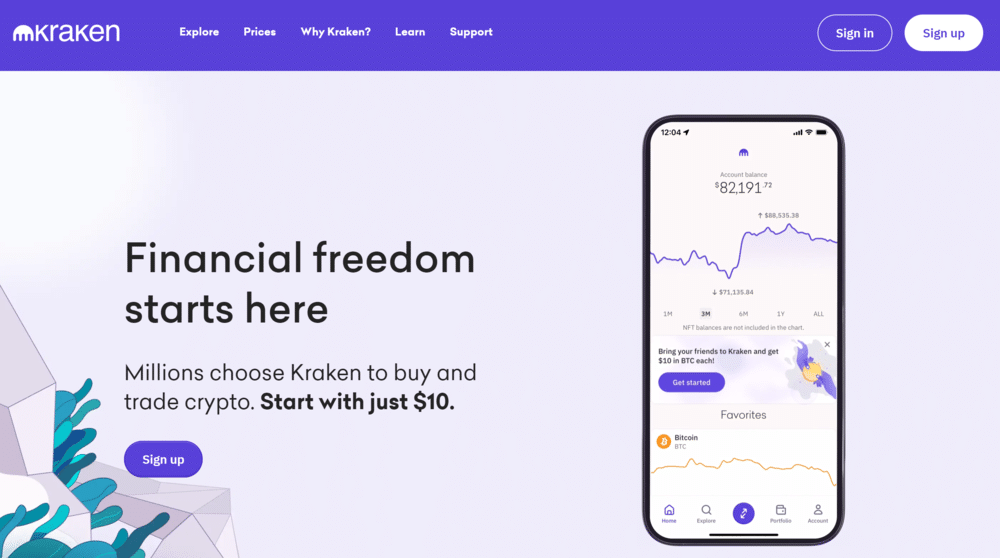 Kraken is a US-based crypto exchange founded in 2011. Today, it’s the 3rd-largest crypto exchange in the world by trading volume and has more than 10 million users across 190 countries. Kraken offers spot trading on more than 200 crypto tokens along with margin and futures trading.
Kraken is a US-based crypto exchange founded in 2011. Today, it’s the 3rd-largest crypto exchange in the world by trading volume and has more than 10 million users across 190 countries. Kraken offers spot trading on more than 200 crypto tokens along with margin and futures trading.
Why We Chose Kraken: Kraken is a beginner-friendly exchange that’s ideal for on-ramping from fiat to crypto. The exchange makes it easy to instantly buy and sell more than 200 cryptocurrencies with a minimum investment of only $10. Kraken accepts 9 fiat currencies including USD, CAD, EUR, GBP, JPY, CHF and AUD.
Kraken charges instant buy fees of 0.9% for stablecoins and 1.5% for other cryptocurrencies. That’s much lower than the 3% or higher fees that many other exchanges charge for instant buys. However, spot trading fees start at 0.26%, which is significantly higher than competitors.
Pros
- User-friendly platform for instant crypto purchases
- Accepts 9 common fiat currencies for deposit
- Lower instant buy fees than competitors
- Offers NFT trading with no gas fees
Cons
- Limited selection of around 200 cryptocurrencies
- Staking not available in the US
8. PrimeXBT – Best Exchange for Crypto Copy Trading
Key Takeaways:
- Global broker offering crypto, forex, stock indices, commodities, and more
- Trade Bitcoin, Ethereum, and 40+ popular altcoins
- Copy trade cryptocurrencies at no extra cost
- Up to 100x leverage available for Bitcoin trading
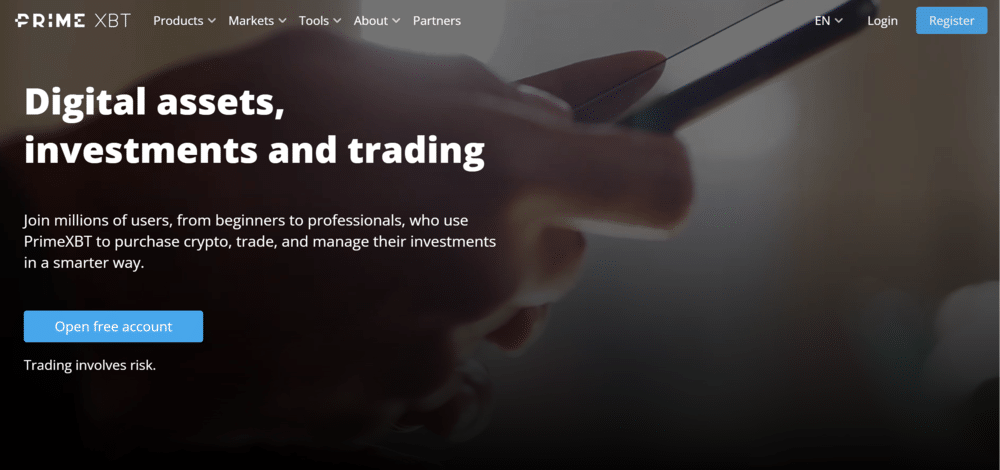 PrimeXBT is a global brokerage firm based in Saint Vincent and the Grenadines that offers trading on crypto, forex, stock indices, and commodities. It has around 1 million users, making it one of the smallest exchanges on our list. PrimeXTB currently offers trading on Bitcoin and 40+ altcoins.
PrimeXBT is a global brokerage firm based in Saint Vincent and the Grenadines that offers trading on crypto, forex, stock indices, and commodities. It has around 1 million users, making it one of the smallest exchanges on our list. PrimeXTB currently offers trading on Bitcoin and 40+ altcoins.
Why We Chose PrimeXBT: PrimeXBT is a broker that offers crypto alongside other assets. So, it’s a good option for users who want to trade crypto alongside forex, commodities, or stock indices. PrimeXBT recently added support for crypto futures trading with fees as low as 0.01%.
We like PrimeXBT for active traders who want to take advantage of copy trading. The platform uses the Covesting copy trading service to provide access to dozens of crypto trading strategies that can execute automatically in your account. There’s no extra cost to copy trade with PrimeXBT.
Pros
- Trade crypto, forex, indices, and commodities in one place
- Low trading fees for crypto futures
- Supports copy trading through Covesting
- 24/7 live chat customer support
Cons
- Only offers around 40 cryptocurrencies
- Doesn’t offer crypto staking
9. ByBit – Best Crypto Exchange for Coin Selection
Key Takeaways:
- Tier-1 crypto exchange offering spot, futures, options, P2P, OTC, and margin trading
- Spot trading available for 1,000+ cryptocurrencies
- Offers advanced trading tools including charts, bots, copy trading, and MetaTrader 4
- Supports 60+ fiat currencies for instant buy and P2P trading
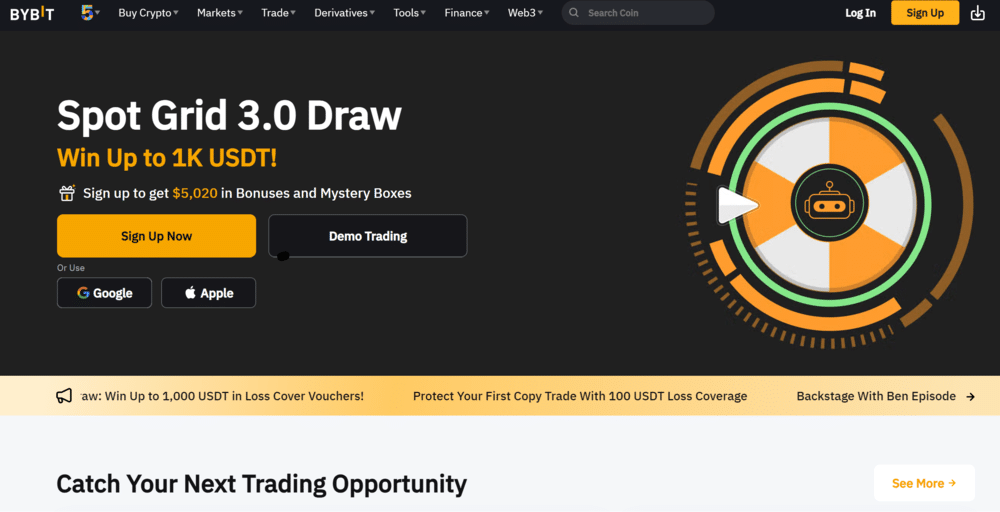 ByBit, founded in 2018, is the 5th-largest crypto exchange in the world. It’s headquartered in Dubai and registered in the British Virgin Islands. ByBit has more than 22 million registered users and lists more than 1,000 cryptocurrencies.
ByBit, founded in 2018, is the 5th-largest crypto exchange in the world. It’s headquartered in Dubai and registered in the British Virgin Islands. ByBit has more than 22 million registered users and lists more than 1,000 cryptocurrencies.
Why We Chose ByBit: ByBit stands out in a crowded field for its massive selection of cryptocurrencies and spot trading pairs. Users on this exchange can buy and sell more than 1,000 individual tokens, including many high potential altcoins that other exchanges don’t list. ByBit also has a huge selection of crypto derivatives, including USDT, USDC, and inverse futures contracts and USDC-based crypto options.
ByBit’s platform can feel overwhelming for beginner crypto users, but it offers a ton of features for more experienced users. Traders will find an advanced charting platform, trading bots, and an OTC trading desk. Investors can take advantage of ByBit’s staking program. There’s also an NFT marketplace, crypto loans, and a Web3 wallet app.
Pros
- Trade more than 1,000 cryptocurrencies
- Supports futures, options, OTC, P2P, and margin trading
- Staking program available for 100+ cryptocurrencies
- Highly secure platform with cold storage for user funds
Cons
- Trading platform can be confusing for new users
- Futures trading fees start at 0.055%
10. Margex – Best Advanced Crypto Trading Tools
Key Takeaways:
- Trading-focused crypto exchange with high liquidity and ultra-fast execution
- Protects against price manipulation by gathering price data from 12 providers
- Only offers crypto futures trading, 100x leverage available
- Trading tools include copy trading, cross-margin accounts, multi-collateral wallets, and Level 2 order book data
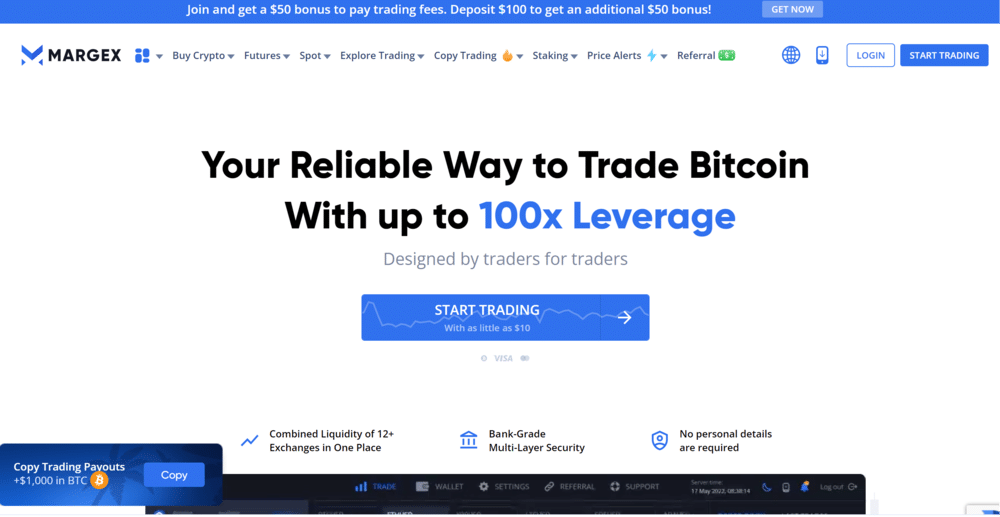 Margex is a crypto exchange designed by traders, for traders. It was founded in 2020 and is based in Seychelles. The exchange has a smaller user base than competitors, but offers lightning-fast execution and protection against price manipulation.
Margex is a crypto exchange designed by traders, for traders. It was founded in 2020 and is based in Seychelles. The exchange has a smaller user base than competitors, but offers lightning-fast execution and protection against price manipulation.
Why We Chose Margex: Margex is specifically designed for crypto trading, whereas many of the other exchanges we reviewed offer trading alongside other services like crypto on-ramping and Web3 applications. The trading platform offers tons of advanced features like cross-margin accounts, multi-collateral wallets, and Level 2 order book data. Traders can go long or short on any position with up to 100x leverage.
Margex currently only offers crypto futures trading, but it plans to roll out spot trading in the near future. New users can buy crypto to start trading with several fiat payment methods, including credit/debit cards and e-wallets. Trading fees for futures start at 0.060%, which is somewhat higher than the industry average.
Pros
- Offers 100x leverage for all crypto futures instruments
- Supports multi-collateral wallets and cross-margin accounts
- Accepts credit/debit cards and e-wallets for on-ramping
- Advanced charting interface with order book data
Cons
- Relatively high futures trading fees
- Doesn’t yet offer crypto spot trading
11. Gemini – Best Crypto Exchange for Beginners
Key Takeaways:
- Beginner-friendly exchange with instant buy, trading platform, and staking
- Low minimum for instant crypto purchases and fees from $0.99 per buy
- Supports 80+ cryptocurrencies
- Staking program offers up to 4.99% APY with no gas fees
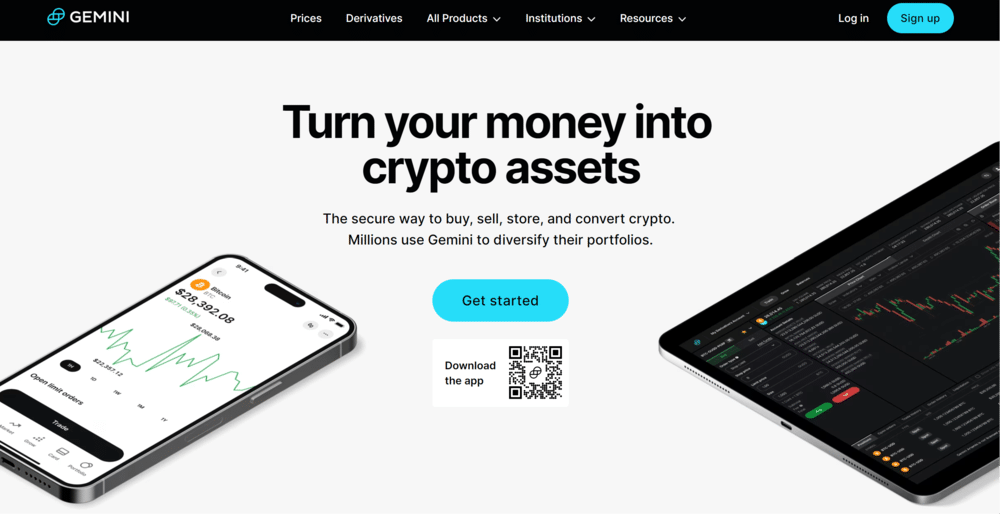 Gemini was founded by Cameron and Tyler Winklevoss, co-founders of Facebook, in 2014. The exchange is the 10th-largest in the world by trading volume. The exchange has faced issues over its Earn program, which lost customer funds when crypto lender Genesis went bankrupt. However, Gemini recently announced that customers will receive approximately 100% of their funds back.
Gemini was founded by Cameron and Tyler Winklevoss, co-founders of Facebook, in 2014. The exchange is the 10th-largest in the world by trading volume. The exchange has faced issues over its Earn program, which lost customer funds when crypto lender Genesis went bankrupt. However, Gemini recently announced that customers will receive approximately 100% of their funds back.
Why We Chose Gemini: Gemini is a beginner-friendly crypto exchange that’s easy for crypto novices to use. The platform enables users to instantly buy and sell more than 80 cryptocurrencies with reasonable fees starting at just $0.99 per purchase. Users can set up recurring investments and purchase as little as $1 worth of crypto at a time.
Gemini has an advanced trading platform called ActiveTrader that’s approachable for new traders. However, beware that it has much higher trading fees than similar platforms at other exchanges—fees start at 0.40%.
Pros
- User-friendly interface, especially for instant crypto buys
- Low fees for instant crypto purchases
- Simple staking offers up to 4.99% APY
- Set up recurring crypto investments
Cons
- Customer support by email only
- High spot trading fees
Our Methodology
We considered a rubric of 8 key factors when evaluating the best cryptocurrency exchanges. Each exchange was scored on a scale of 1-10 in each of these categories, and we weighted each category to determine an overall score for each exchange. Final scores were tallied to determine the top 10 exchanges.
Coin and Instrument Selection: 20%
We considered the number of cryptocurrencies and spot trading pairs available at each exchange. This evaluation included whether an exchange has a launchpad for new tokens and discovery tools to help users find new coins to trade.
In addition, we examined whether an exchange offered other instruments such as crypto futures contracts and options contracts. We also considered the availability of margin trading and OTC trading in this category.
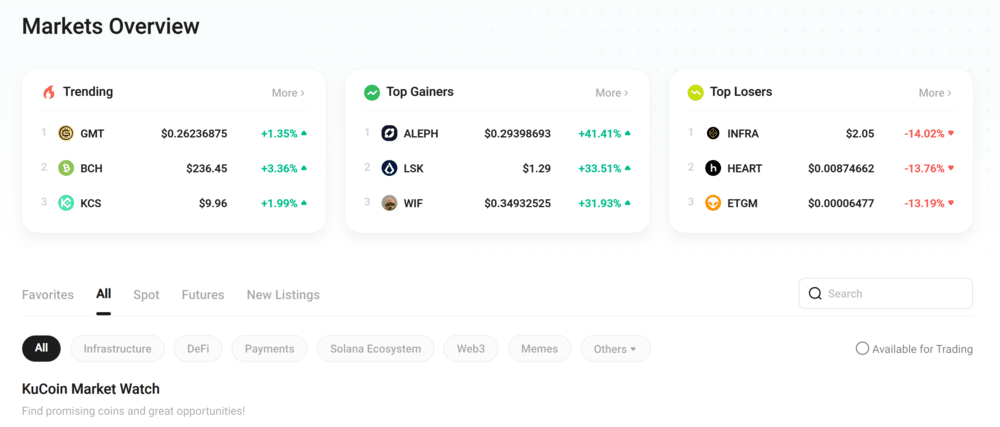
Trading Fees: 20%
We looked at each exchange’s fee structure in detail to determine what an average user would pay to instantly buy or sell crypto, spot trade popular cryptocurrencies, and trade crypto futures. We also looked at other fees such as withdrawal fees and wallet fees.
Many exchanges offer fee discounts for volume or holding the exchange’s native token, and we factored these discounts into our evaluation.
Trading Tools: 15%
Trading tools include an exchange’s charting and analysis platform, risk management features, and trade planning tools. We looked for the availability of trading bots, copy trading, and third-party software like MetaTrader. We also checked whether exchanges offered Level 2 order book data and the ability to create custom technical indicators.
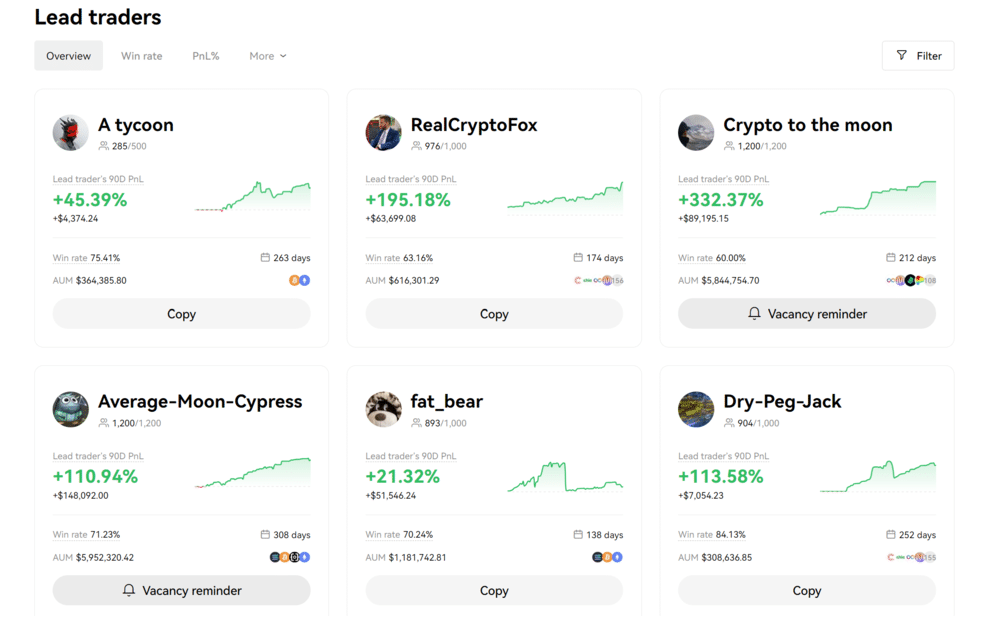
User Experience: 15%
Our user experience evaluation was subjective, based on our own interpretation of how easy or difficult an exchange platform was to use. Exchanges gained points in this category for offering streamlined product menus and responsive trading platforms. Some exchanges lost points in this category due to confusing fee structures, glitchy platforms, or difficult registration procedures.
We considered an exchange’s mobile app as part of its user experience. We looked at whether all online features were available in the app, including instant buy tools and charts.
Regulation and Security: 10%
Many crypto exchanges are lightly regulated, while others do business in highly regulated jurisdictions like the US. We considered what authorities an exchange answers to and whether it makes financial information public.
We also looked at each exchange’s security measures, such as cold storage and multi-factor authentication.
Additional Services: 10%
Many exchanges offer additional crypto services such as P2P trading, NFT marketplaces, Web3 wallets, and staking. We considered what additional services were available since they allow users to branch further into the crypto world without having to move funds across platforms.
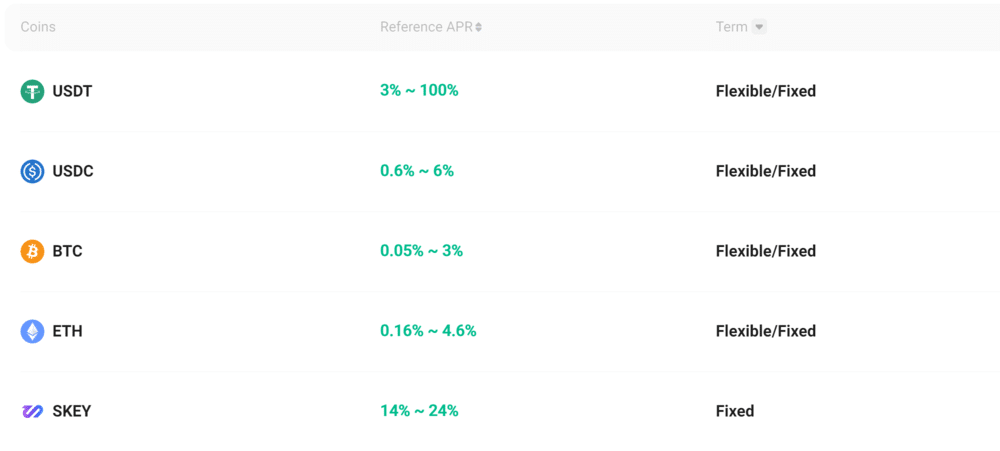
Reputation: 5%
Since many crypto exchanges are private and lightly regulated, the best indicator of whether they’re trustworthy is often their reputation among customers. We considered what users have to say about top exchanges and whether exchanges have suffered hacks or legal trouble.
Customer Service: 5%
We considered what channels each crypto exchange offers for customer service and what hours the service team is available.
What is a Crypto Exchange or App?
A crypto exchange is a business that enables users to trade fiat currencies (like US dollars) for cryptocurrency or to trade one cryptocurrency for another.
From a user perspective, crypto exchanges operate somewhat like stock brokers. Just as stock brokers enable customers to deposit funds and purchase stocks, so crypto exchanges enable customers to deposit funds and purchase crypto tokens.
However, where stock brokers place customer orders with stock exchanges (such as the NASDAQ exchange), cryptocurrency exchanges make the market for orders they receive. That is, when an exchange receives an order to buy Bitcoin from a customer, it fulfills that order itself.
Many crypto exchanges offer custody wallets so that they can hold users’ funds in their exchange account. This makes it easier for exchange users to buy and sell tokens. Alternatively, customers can also self-custody their cryptocurrencies, moving tokens off the exchange into a wallet they own.
Different Types of Crypto Exchanges
Cryptocurrency exchanges can be divided into 2 main types: centralized crypto exchanges and decentralized crypto exchanges. We’ll explain the difference.
Centralized Exchanges
Centralized crypto exchanges, also known as CEXs, are intermediaries that facilitate trades between buyers and sellers. When users enter orders, a CEX serves as the counterparty for the trade and provides the liquidity to fulfill the order.
This means that if a user buys Bitcoin, the Bitcoin they buy comes directly from the CEX itself rather than a user who’s selling Bitcoin at that moment. A CEX takes on some risk in this transaction, and it charges higher trading fees to account for that risk.
All of the exchanges we reviewed above are centralized crypto exchanges.
Advantages of Centralized Exchanges:
- Often have higher liquidity than decentralized exchanges
- Regulated entities that work hard to stay in compliance
- Offer more features than decentralized exchanges, including customer support
- Don’t require users to self-custody their crypto tokens
Decentralized Exchanges
Decentralized crypto exchanges, also known as DEXs, are automated exchange platforms that don’t act as intermediaries in trades. Instead, DEXs use algorithms to match buy and sell orders.
That means that if a user buys Bitcoin, the Bitcoin they buy comes directly from another user who’s selling Bitcoin at that moment.
DEXs are essentially computer programs and can run on servers around the world. Many DEXs don’t have headquarters and are not overseen by any financial regulator. However, DEXs also don’t provide crypto on-ramps—that is, there’s no way to convert fiat to crypto or vice versa.
Advantages of Decentralized Exchanges:
- Offer a wider range of crypto tokens than centralized exchanges
- Lower trading fees than centralized exchanges
- Allow users to convert cryptocurrencies anonymously
- You maintain custody over your cryptocurrency
Global Crypto Exchanges
Another category of crypto exchanges worth mentioning is global exchanges. These are CEXs that operate in most countries around the world, rather than only in one country or a confined region.
All of the crypto exchanges that we reviewed are considered global crypto exchanges because they’re available in 170+ countries.
How Do Cryptocurrency Exchanges Work?
Cryptocurrency exchanges offer two central services:
- They enable users to convert fiat currency to cryptocurrencies and back
- They enable users to swap one cryptocurrency for another
By enabling users to buy cryptocurrency with fiat, crypto exchanges serve as on-ramps into the crypto world. Users can buy Bitcoin or other cryptocurrencies with dollars, then swap that cryptocurrency for other tokens in search of trading profits.
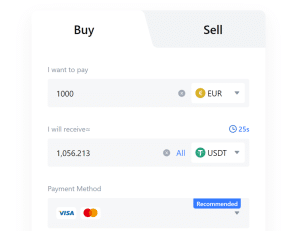
A major difference between cryptocurrency exchanges and brokers that offer cryptocurrency trading (such as Robinhood, Webull, and Fidelity) is that exchange users can move their tokens off the exchange into a self-custody wallet. This enables exchange customers to use their crypto tokens for applications like DeFi, crypto lending, investing in crypto presales, and more.
With traditional brokers, users can’t move crypto off the platform, so they’re limited to buying crypto and then selling it for fiat. Most traditional brokers that enable users to buy crypto also don’t offer a way to swap one crypto for another, which greatly limits users’ ability to trade crypto markets.
Many of the additional services that crypto exchanges offer, such as NFT marketplaces, crypto margin trading, and crypto futures, are not available from traditional brokers. There are many decentralized, blockchain-based platforms that offer these services—but users must already own crypto (likely purchased through an exchange) to use them.
Are Crypto Exchanges Worth It?
Crypto exchanges are one of the simplest and most affordable options to buy cryptocurrency with fiat or sell cryptocurrency for fiat.
Other ways to buy and sell Bitcoin include Bitcoin ATMs and P2P trading platforms, but these are significantly more expensive. It’s possible to mine Bitcoin, but this is complex and may require a significant investment in mining equipment.
While traditional stockbrokers may offer Bitcoin and some altcoins, users can’t do anything with tokens purchased this way except sell them.
There are some drawbacks to using crypto exchanges, including that you cannot buy crypto anonymously. However, there are now few legal ways to buy cryptocurrency without providing personal information thanks to government crackdowns to prevent money laundering.
Fees on centralized crypto exchanges can be somewhat high, which is why many users switch to using decentralized exchanges to swap from one crypto to another. However, DEXs don’t provide a way to buy crypto with fiat or sell crypto for fiat.
How to Choose a Cryptocurrency Exchange
There are a number of important factors to consider when choosing the best crypto exchange for your needs. We’ll review some of the key things to think about.
Security
Security should come before all else when choosing a crypto exchange. If you don’t trust that your funds are secure with an exchange, you shouldn’t use it.
Security features to look for include multi-factor authentication for your account and cold storage for users’ cryptocurrencies on the exchange. Exchanges should also give you the option to move your tokens into a self-custody wallet, putting you in control of the private key to access your crypto tokens.
Several major crypto exchanges have suffered hacks in recent years, but most established exchanges have insurance and emergency funds to make customers whole in these cases. Be sure to check whether an exchange has reported any major losses of customer funds before signing up.
Educational Resources
Educational resources can be very helpful for first-time exchange customers to learn about how to buy and trade cryptocurrency. Many exchanges offer detailed guides to different tokens, explaining what they do and what causes their prices to move. In addition, exchanges may offer detailed information about how to use their trading platform or common crypto trading strategies.
While these educational resources aren’t essential, they can vastly improve a new user’s experience with an exchange.

Available Coins
The breadth of coins available to trade is another major factor to consider when picking a crypto exchange. Some exchanges have a few dozen tokens, while others offer trading on more than 1,000 tokens.
In addition to how many tokens are available for spot trading, be sure to check whether an exchange offers futures trading or options trading. Other ways to trade, such as margin trading, OTC trading, and P2P trading, can be important for advanced users.
Finally, be sure to check how frequently an exchange lists new tokens. Some exchanges rarely list new tokens, while others have built-in launchpads to encourage investment in promising new cryptos.
Trading Volume
An exchange’s trading volume is important because it impacts liquidity for trading. The more trading volume an exchange has, the easier it will be to buy and sell tokens at the current market price without slippage.
Avoid exchanges that have low trading volume, since it can be difficult to buy and sell tokens at your desired price.
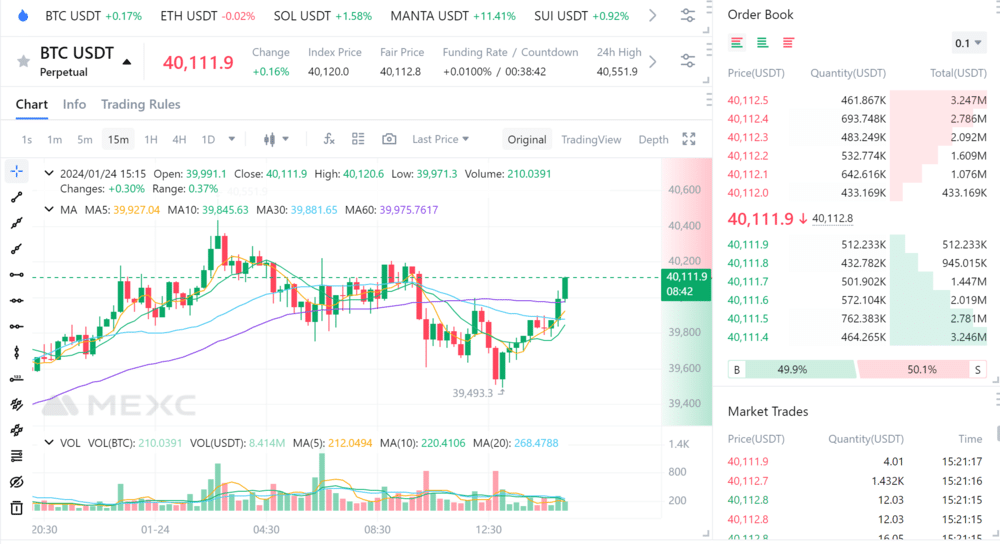
Accessibility
Not all exchanges are available in all countries. In fact, many exchanges don’t accept US customers. While US users may be able to access these exchanges with a VPN, exchanges are increasingly cracking down on this practice to avoid trouble with US regulators.
Exchanges on our top 10 list that are available in the US include: Binance (US site), Coinbase, Kraken, and Gemini.
Crypto Exchange Fees
Crypto exchanges charge several fees, including trading fees, withdrawal fees, and other account fees. Let’s take a closer look.
Trading Fees
Crypto exchanges charge fees every time a user buys, sells, or swaps cryptocurrencies. There are typically different fee rates for different types of transactions:
- Instant buy/sell fees: Fees for buying and selling crypto instantly with fiat can incur a fixed rate per transaction (for example, $0.99 per trade) or a percentage rate that usually ranges from 1.0%-3.5%. It typically costs much more to use an exchange’s instant buy feature than to make a deposit and buy crypto through spot trading.
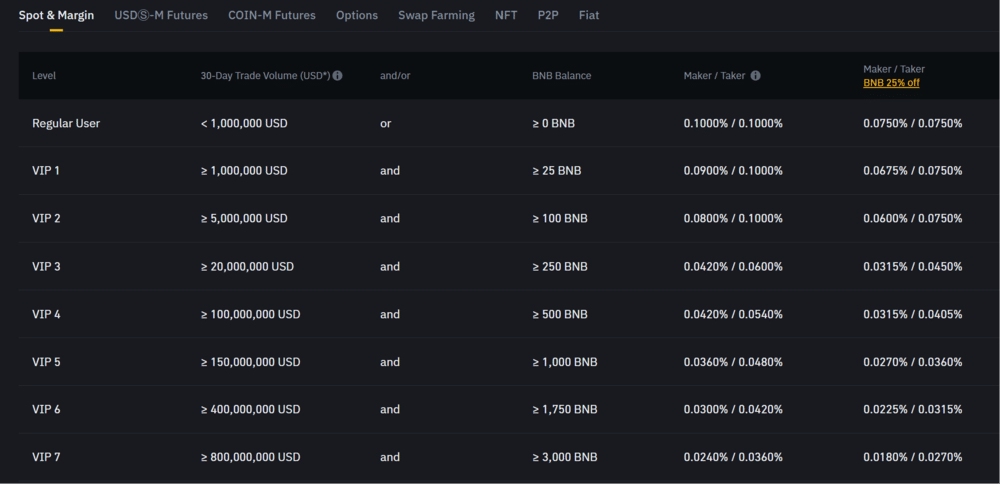
- Spot trading: Spot trading involves placing buy and sell orders through an exchange’s trading interface. At most exchanges, spot trading fees start around 0.1% for trades that remove liquidity from the market (such as limit buy orders) and 0.08% for trades that add liquidity to the market (such as limit sell orders). Customers can qualify for reduced spot trading fees if they have high monthly trading volume or hold an exchange’s native token.
- Futures trading: Crypto futures trading fees typically start at 0.01% for trades that remove liquidity from the market and 0.005% for trades that add liquidity to the market. Customers can qualify for reduced fees if they trade a certain volume of contracts each month.
Withdrawal Fees
Some crypto exchanges charge withdrawal fees when customers withdraw fiat or crypto from their account.
Fees vary based on the withdrawal method for fiat—bank transfers are often free, but wire transfers or payments to a credit/debit card are not. Expect to pay $10-$25 per withdrawal using these methods.
For crypto, withdrawal fees vary based on the coin being withdrawn. In addition to the exchange’s withdrawal fee, the token holder will need to pay blockchain network fees for transferring the token to another wallet. These fees are typically small but vary by blockchain.
Other Fees
Most crypto exchanges don’t charge any additional fees. However, some platforms charge custody fees for holding users’ cryptocurrencies or deposit fees for payment methods like wire transfers.
Traders who use margin will pay percentage-based margin rates, which can vary widely depending on trade conditions.
Best Crypto Exchanges and Apps: Bottom Line
Choosing the best crypto exchange can ensure your crypto trading experience is as good as possible. Top exchanges offer access to a wide range of tokens and powerful trading tools while charging low trading and account fees.
Based on our thorough evaluation, we found the top crypto exchanges for 2024 are eToro, MEXC, OKX, and KuCoin. Runners up include Binance, Coinbase, Kraken, PrimeXBT, ByBit, Margex, and Gemini.
References
- https://coinmarketcap.com/rankings/exchanges/
- https://www.coindesk.com/policy/2023/11/21/binance-to-settle-charges-with-us-doj-source/
- https://www.binance.com/en/support/announcement/binance-launches-zero-fee-bitcoin-trading-10435147c55d4a40b64fcbf43cb46329
- https://www.coindesk.com/business/2023/11/27/coinbase-is-dominating-a-key-bitcoin-etf-service-can-anyone-else-join-the-race/
- https://www.coindesk.com/business/2023/09/13/beleaguered-gemini-earn-customers-will-be-made-nearly-whole-dcg-and-genesis-say-about-remuneration-plan/
- https://www.cnn.com/2023/11/22/business/takeaways-binance-crypto-crackdown/index.html
FAQs
What is a crypto exchange?
A crypto exchange is a platform that enables users to buy cryptocurrency and swap one cryptocurrency for another. Exchanges act as counterparties for trades, providing liquidity so that buy and sell orders can be executed smoothly.
How much money do you need to buy crypto?
Many crypto exchanges don’t have a minimum deposit or minimum order size. So, it’s possible to buy cryptocurrency starting with as little as $1. However, it’s a good idea to buy $100 or more to minimize the relative impact of trading fees.
How do I open a crypto exchange account?
New crypto exchange customers can open an account by visiting their chosen exchange and clicking ‘Sign Up.’ You’ll need to provide your name, email, phone, address, and a copy of your ID to comply with anti-money laundering requirements.
How do cryptocurrency exchanges make money?
Cryptocurrency exchanges make money by charging a small fee for every trade. Over millions of trades per day, these fees can add up.
Which crypto exchange has the lowest fees?
Binance has the lowest fees for spot crypto trading. Trading fees start at 0.1% for makers and takers, with a 25% discount for users who own $BNB tokens. In addition, there are no trading fees for Bitcoin trading pairs.
Which crypto exchange does not report to the IRS?
Crypto exchanges based outside the US often do not report trading activity to the IRS. However, all US residents are legally required to report crypto trading activity to the IRS. Failing to do so may constitute tax fraud.
Disclaimer: Crypto is a high-risk asset class. This article is provided for informational purposes and does not constitute investment advice. You could lose all of your capital.About Cryptonews
At Cryptonews, we aim to provide a comprehensive and objective perspective on the cryptocurrency market, empowering our readers to make informed decisions in this ever-evolving landscape.
Our editorial team, comprised of more than 20 professionals in the crypto space, works diligently to uphold the highest standards of journalism and ethics. We follow strict editorial guidelines to ensure the integrity and credibility of our content.
Whether you’re seeking breaking news, expert opinions, educational resources, or market insights, Cryptonews.com is your go-to destination for all things crypto since 2017.


 Connor Brooke
Connor Brooke 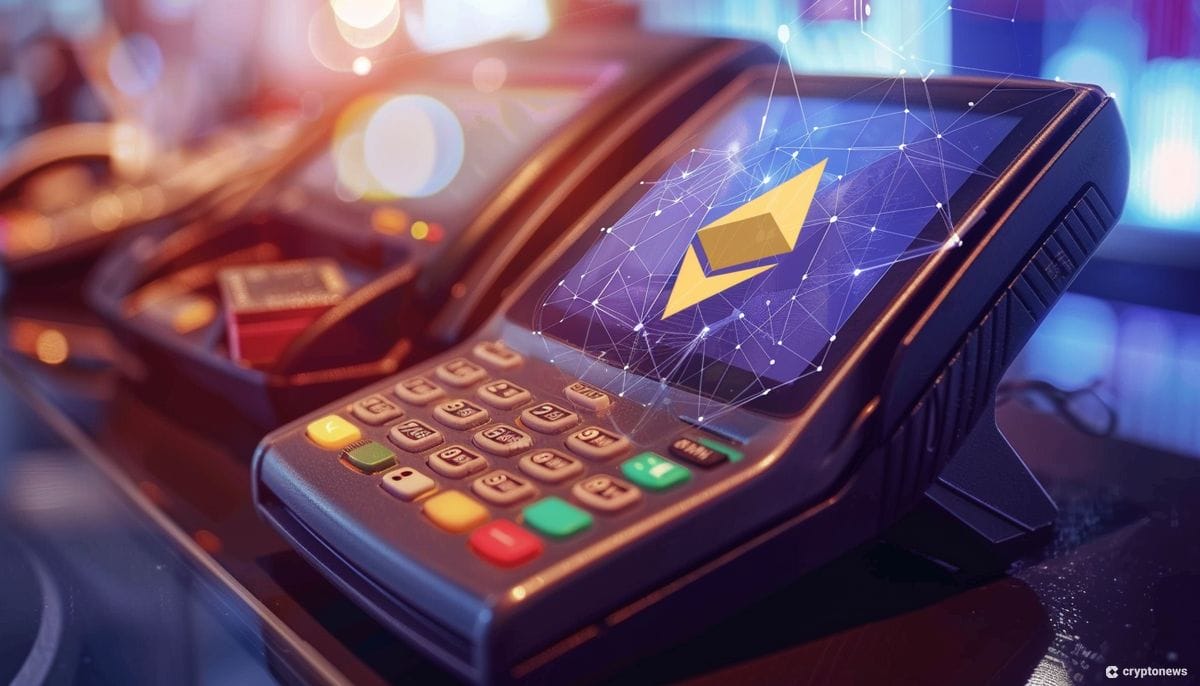

 Nick Pappas
Nick Pappas 
 Eliman Dambell
Eliman Dambell